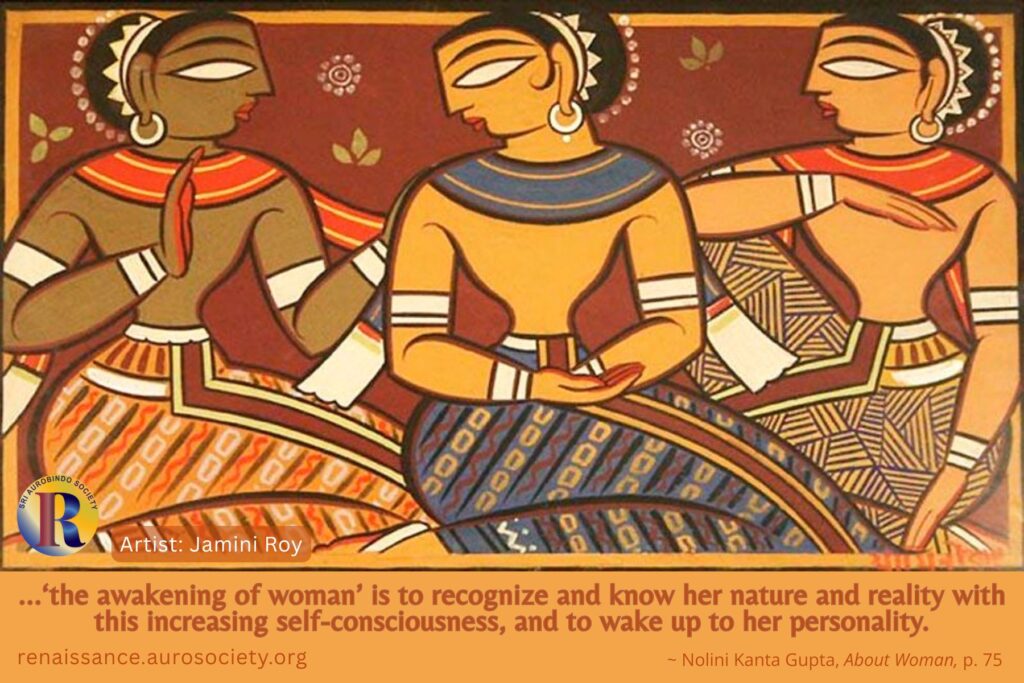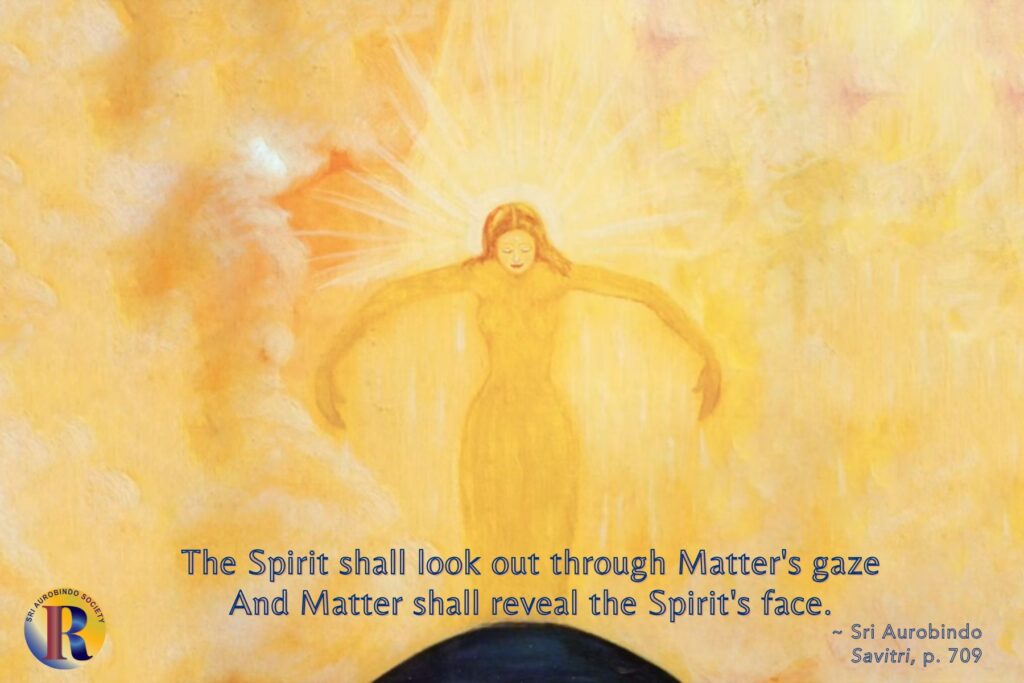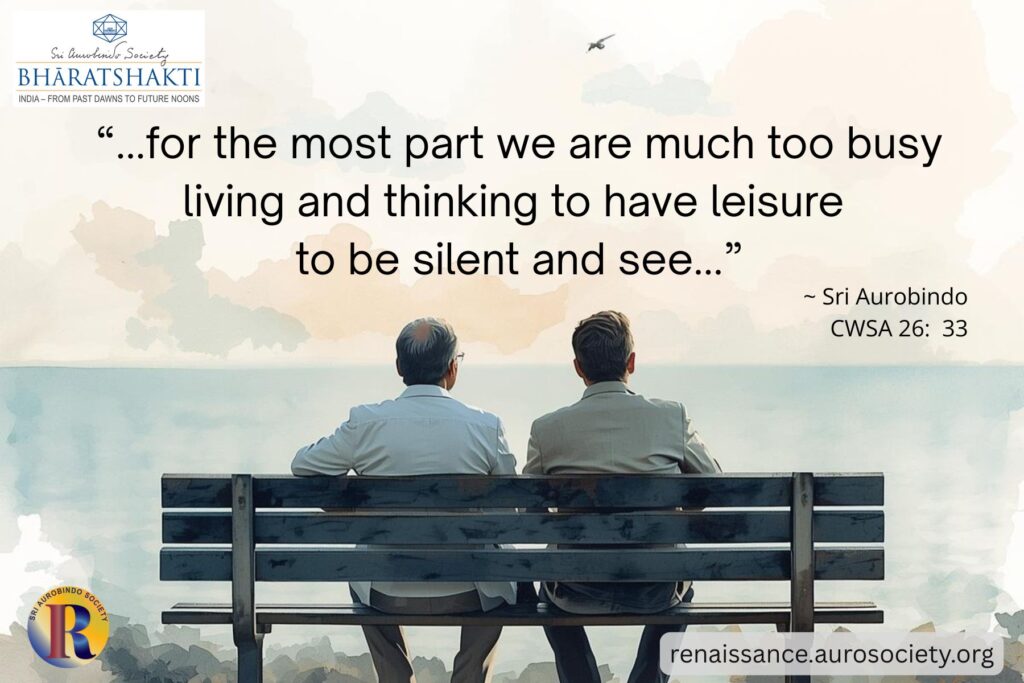Editor’s Note: In the last part of this three-part article, the author highlights the words of the Mother and Sri Aurobindo to throw light on the origin and nature of parental love and love between family relations and friends. We also see how human love and relationships can never satisfy the deep thirst for love which can only be quenched by the divine love.

Continued from PART 2
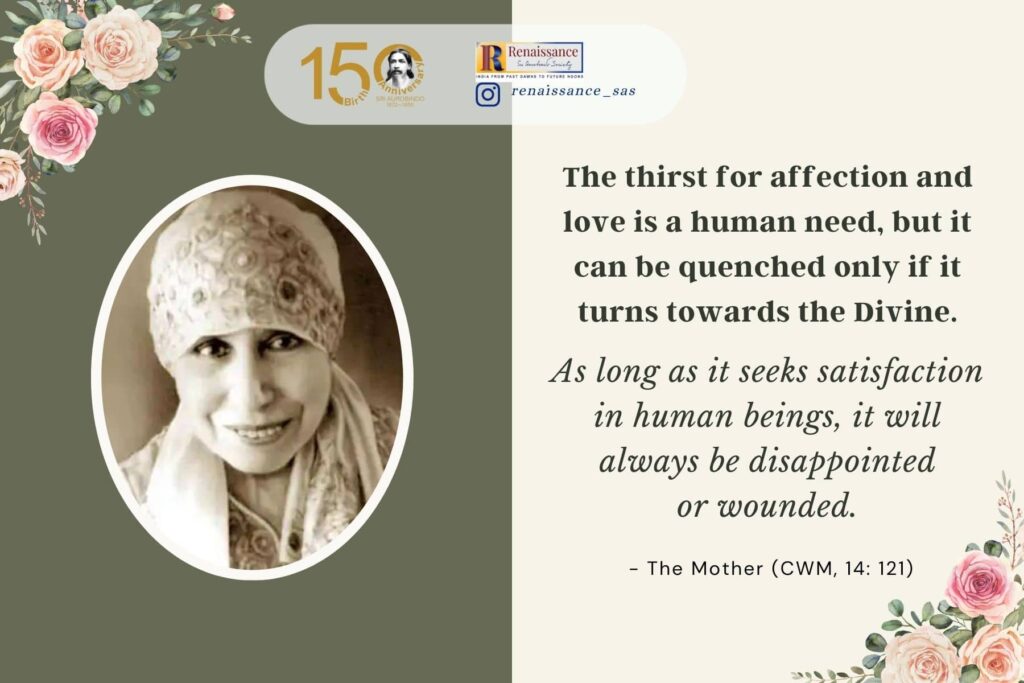
Human Love and Relations
Love between human beings expresses itself through various relations – parent-child, siblings, married couple, lover and beloved, friendship, extended family, etc. Then there is also the relation between humans and animals.
What is the nature of love across some of these relations, and how it may be raised to a higher movement? It is important to explore this question and its related aspects.
Love of parents for children
So many stories and books have been written, movies have been made about the love of parents for their children, especially the love of a mother. Maternal love is often considered the most unconditional love. But is it really so?
Is any human love unconditional in the truest sense? What about the role of the mother as a disciplinarian for the child? As an adult responsible for teaching the child the right values and give a positive start in life, doesn’t a parent also expect the child to behave in a certain way? How does such expectation or desire change the nature of the parental love? And what about the case where there is more than child? Does a mother love all her children equally?
Most of the instinctive answers to such questions, in our ordinary experience, are shaped by the stories of motherhood we have heard in our lives, the books we have read, the films we have watched. Each culture has created its own myths and stories, its own ideals of motherhood.
In India, we have those countless stories of Yashoda’s love for Krishna and Kaushalya’s love for Rama. Stories of father’s love for their children are also not wanting. We have Dashratha who even gives up his life when separated from his first-born son, Rama.
The Mahabharata presents to us many different examples of parental love, some of which actually compel us to dig deeper into the nature of parental love.
For instance, on one side we have Dhritrashtra who is so attached to his sons that he is even unable to stop them from doing all kinds of wrong and adharmic actions. On the other side, we also have Kunti who finally admits to Karna that he is in fact her first-born son whom she had given away because she was unmarried at the time. But she chooses to tell him about this truth only when she finds out that Karna would be fighting against her other five sons and has also taken a vow to kill Arjuna.
There are many such stories that throw light on different aspects of parental love and in particular the love of a mother. These stories help us to move beyond the unthinking idea that a mother’s love is unconditional in all cases.
The Mother was once asked the question – “what kind of love do parents have for their children?” Let us read her detailed response and reflect carefully on it.
What kind? A human love, don’t they? Like all human loves: frightfully mixed, with all sorts of things. The need of possession, a formidable egoism. At first, I must tell you that a wonderful picture has been painted… many books written, wonderful things said about a mother’s love for her children. I assure you that except for the capacity of speaking about the subject in flowery phrases, the love of the higher animals like the… well, the mammals for their children is exactly of the same nature: the same devotion, the same self-forgetfulness, the same self-denial, the same care for education, the same patience, the same…
I have seen absolutely marvellous things, and if they had been written down and applied to a woman instead of to a cat, superb novels would have been made, people would have said: “What a person! How marvellously devoted are these women in their maternal love!” Exactly the same thing. Only, cats could not use flowery language. That’s all. They could not write books and make speeches, that is the only difference.
But I have seen absolutely astonishing things. And that kind of self-giving and self-oblivion—as soon as there is the beginning of love, it comes. But men… I sincerely believe, from all that I have studied, that there is perhaps a greater purity in animals for they do not think, while human beings with their mental power, their capacity of reflecting, reasoning, analysing, studying, all that, oh! They spoil the most lovely movement. They begin to calculate, reason, doubt, organise.
(CWM, Vol. 6, p. 106)
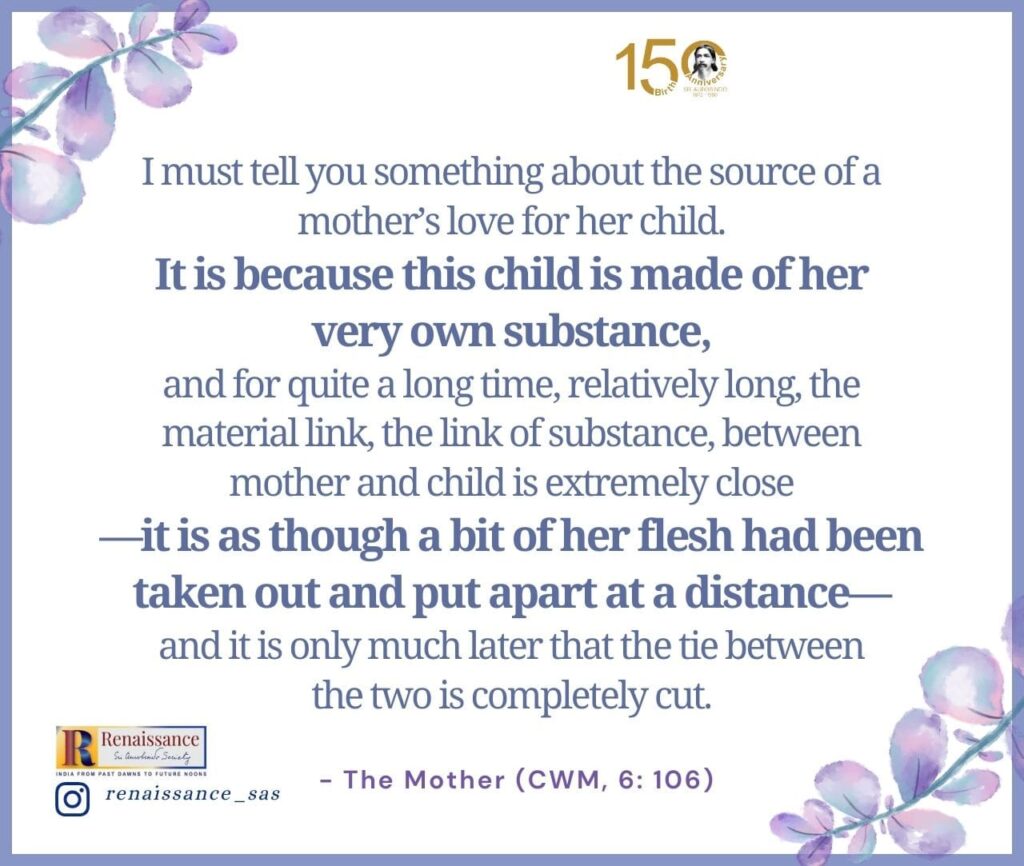
The Mother continues her detailed answer to this important question.
Take, for instance, parents. At the risk of removing many illusions in your consciousness, I must tell you something about the source of a mother’s love for her child. It is because this child is made of her very own substance, and for quite a long time, relatively long, the material link, the link of substance, between mother and child is extremely close—it is as though a bit of her flesh had been taken out and put apart at a distance—and it is only much later that the tie between the two is completely cut.
There is a kind of tie, of subtle sensation, such that the mother feels exactly what the child feels, as she would feel it in herself. That then is the material basis of the mother’s attachment for the child. It is a basis of material identity, nothing else but that. Feeling comes much later (it may come earlier, that depends on people), but I am speaking of the majority: feeling comes only long afterwards, and it is conditioned. There are all kinds of things…. I could speak to you for hours on the subject. But still this must not be mixed up with love.
It is a material identification which makes the mother feel intimately, feel quite concretely and tangibly what the child is feeling: if the child receives a shock, well, the mother feels it. This lasts at least for two months. This is the basis. The rest comes from people’s nature, their state of development, their consciousness, education and capacity for feeling. This is added to the first.
And then there are all the collective suggestions that make up all sorts of stories—for people are wonderful at constructing stories. They write novels about everything. They have used their minds to build up their imaginations which go round in the atmosphere and then are caught just like that. So some catch a certain type of these, others another kind, and then, as imagination is a force of propulsion, with it one begins to act, and then finally one makes a novel of one’s life, if he is in the least imaginative….
This has absolutely nothing to do with the true consciousness, with the psychic being, nothing at all, but people come and talk to you in flowery language and tell you stories—all these are wandering imaginations. If one could see, that is, if you could see this mental atmosphere, that of the physical mind, which is circulating everywhere, making you move, making you feel, making you think, making you act, oh, good heavens! You would lose many of your illusions about your personality. But indeed it is like that. Whether one knows it or not, it is like that”.
(CWM, Vol. 6, pp 106-108)
Now doesn’t this radically alter our view of paternal and maternal love for the child?
Duties toward family
Having briefly explored the nature of parental love let us now look at the children’s duty toward their parents. The notion of family duties is an important one for people in the grihastha stage of their life. Dharmashastra-s and also our itihāsa-s have spoken much about this.
Service to parents is part of family and social duty. But here again, one’s attitude toward such duty is important to consider. The psychic element of love and the quality of self-giving will not be there if one does it only as a social obligation, or even for the sake of attachment to the parents.
The important thing to remember is that even when living in the family and fulfilling one’s social duties, one can prepare oneself for higher goal in life of spiritual release.
This can be done by consciously remembering the Divine in all and by doing all one’s duties as a sacrifice for the sake of the Divine. This will not only help the person evolve inwardly, but also free oneself from the chains of attachment which only bring misery and suffering. This is how love for parents can purify itself and grow more toward its true psychic quality.
Even the earning of money and looking after family affairs can be and be done in a spirit of entire detachment if one truly wants to evolve in one’s consciousness through family life.
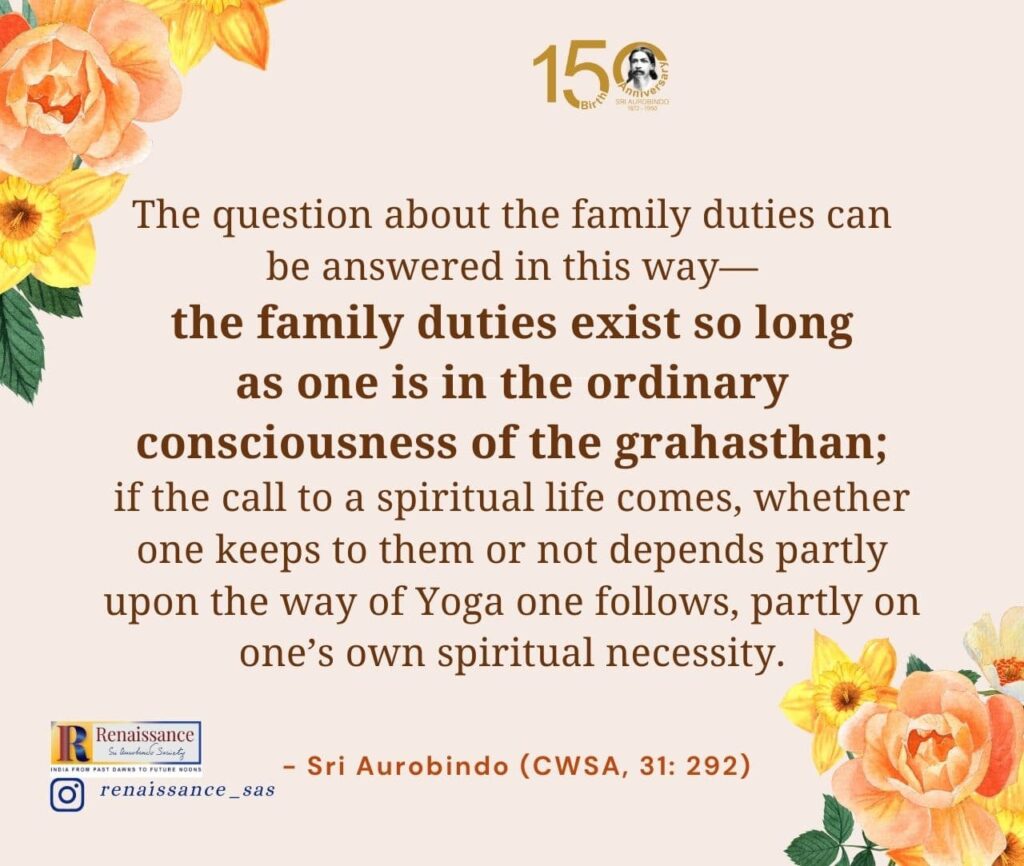
Read:
Sri Aurobindo on Family Relations in Yoga
Love between friends
In ordinary life, friendships are generally founded upon shared interests, similar views toward life and its goals, regular association such as being school or college mates or work colleagues, etc. In some rare cases, there is a natural genuine mutual affection, even when there may not be much commonality on the surface.
We find one of the most wonderful examples of such true friendship in the story of Krishna and Sudama. In the Mahabharata we also find the story of friendship between Duryodhana and Karna which can be a good subject of study for the dilemma between one’s duty toward a friend and one’s duty toward dharma, the right and the true.
The play of human egoism is active in relation between friends just like in all human relationships. This is what also gives them a fleeting character, as we commonly hear people speak of friends who change with time.
It is important that more and more people begin to see friendship, brotherhood, love to be sacred things, rooted in the soul, and not as things “broken at every moment by the movements of the ego, soiled and spoiled and destroyed by the passions, jealousies, treacheries to which the vital is prone” (Sri Aurobindo, CWSA, Vol. 31, p. 295).
For that to happen, much purification of the vital is necessary. All clinging, all insistence for possession, petty emotions, sentimentalism, feeling of hurt, pride, envy etc. have to fall away if one wants to experience true affection. Love and affection have to be rebased on a deeper and higher consciousness.
From Love Human to Love Divine
We all crave for affection and love. It is one of the basic human needs. We try to satisfy this need through all our loves – love for the family, love for the beloved, love for friends, etc. And somehow or the other, at some point in time we go through much pain and struggle on account of love. We have seen why that is so. Thus, despite all our loves, something in us remains dissatisfied, our thirst for love remains unquenched.
The thirst for affection and love is a human need, but it can be quenched only if it turns towards the Divine. As long as it seeks satisfaction in human beings, it will always be disappointed or wounded.
~ The Mother (CWM, Vol. 14, p. 121)
Sri Aurobindo gives a solution to overcome such disappointment and disillusionment. In many cases this is often the start of seeking for something deeper, something more lasting in nature, something eternal. Out of a disenchantment with imperfect and impermanent human love comes a new beginning for some, beginning of a seeking for love divine, love that is true.
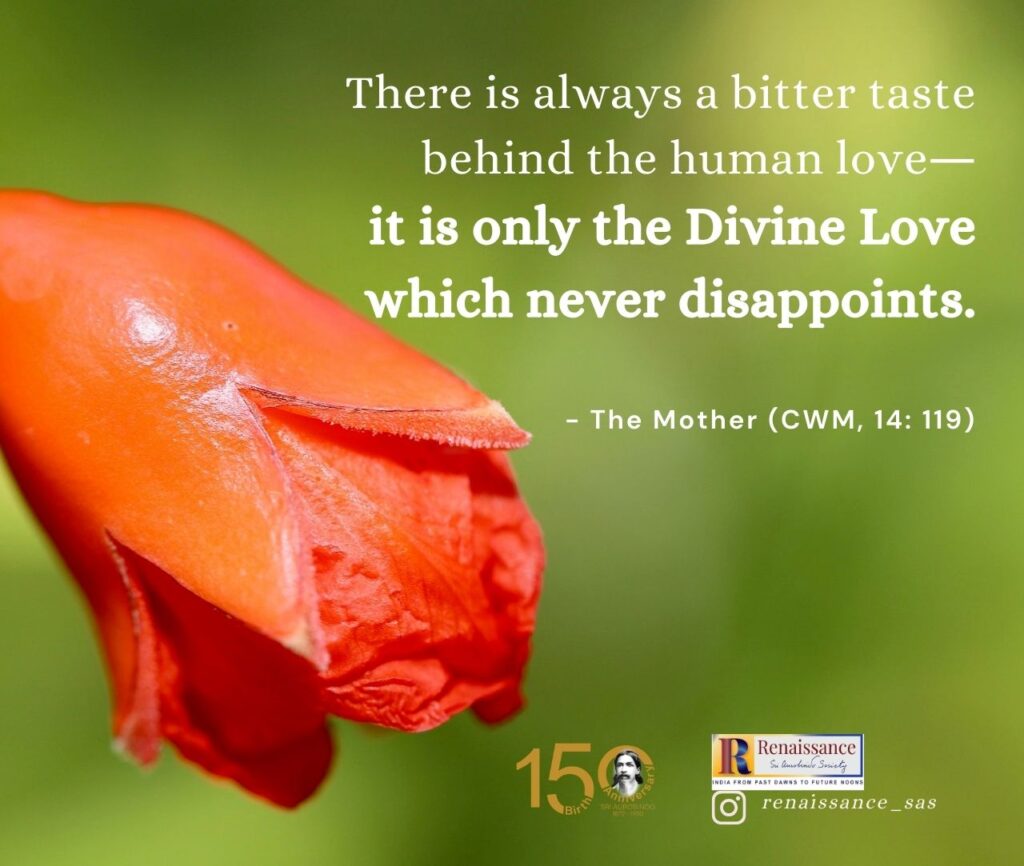
The way to an ideal of spiritually rooted love is different for different people.
For some the way is to leave everything else to follow the Divine alone, the way of the ascetic. However, this doesn’t really mean an aversion for anybody any more than it means aversion for the world and life, says Sri Aurobindo.
It only means absorption in one’s central aim, with the idea that once that is attained it will be easy to found all relations on the true basis, to become truly united with others in the heart and the spirit and the life, united in the spiritual truth and in the Divine.
(CWSA, Vol. 31, p. 289)
But there is also another way, the path of purification and transformation of the vital.
The other way is to go forward from where one is, seeking the Divine centrally and subordinating all else to that, but not putting everything else aside, rather seeking to transform gradually and progressively whatever is capable of such transformation.
All the things that are not wanted in the relation, – impurity, jealousy, anger, egoistic demand, – drop away as the inner being grows purer and is replaced by the unity of soul with soul and the binding together of the social life in the hoop of the Divine.
~ Sri Aurobindo (CWSA, Vol. 31, p. 289)
This path essentially means progressively establishing one’s poise at a deeper psychic level instead of vital ego. It requires that jealousy, strife, hatred, aversion, rancour and all other evil vital feelings must be altogether abandoned. All egoistic love and attachment will have to disappear also.
This is the path toward an integral perfection. This is the path that leads the individual and the collective to a greater Harmony – within and without, and to a deeper Love, love that heals, love that quenches the deepest thirst.
CONCLUDED
Read previous parts: PART 1 & PART 2
Also Read:
The Mother on Love Divine and Human
***
~ Design: Raamkumar

